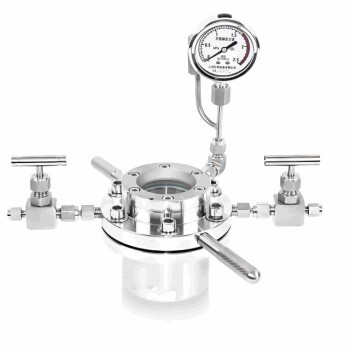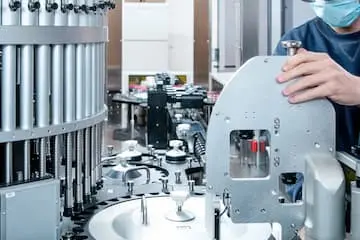A pressure reactor, also known as a pressure tube or sealed tube, is a specialized chemical reaction vessel designed to perform reactions under high pressure conditions. It is a type of pressure vessel, uniquely designed to withstand high-pressure environments. The pressure within the reactor can arise either from the reaction itself or an external source, such as the use of hydrogen in catalytic transfer hydrogenation.
Toggle Categories
Get Instant Support
Choose your preferred way to connect with our team
-
Get Free Quote Fill out form for detailed pricing
-
Send Email Detailed inquiry support
-
WhatsApp Quick mobile chat
Response Time
Within 8 hours on working days, 24 hours on holidays
High Pressure Reactor

Stainless High Pressure Autoclave Reactor Laboratory Pressure Reactor
Item Number: RE-1H

Mini SS High Pressure Autoclave Reactor for Laboratory Use
Item Number: KV-3H

Visual High-Pressure Reactor for In-Situ Observation
Item Number: KT-VHPR

High Pressure Laboratory Autoclave Reactor for Hydrothermal Synthesis
Item Number: KR-3H
Advantages
A pressure reactor has advantages over a round-bottom flask. It allows reactions above solvent boiling points and reduces reaction volume to increase concentration, collision frequency, and accelerate reactions.
Pressure accelerates desired reactions and minimizes competing reactions, without impacting decomposition unless involving gas.
A pressure reactor can satisfy four green chemistry principles by using less solvent and producing cleaner profiles, saving electricity and water, and preventing gas release and explosions.
Metal pressure reactors
Metal pressure reactors are highly advantageous for conducting high-pressure reactions, as they possess a much higher pressure rating than glass reactors. Despite having their own distinct flaws, such as susceptibility to corrosion, the correct material of construction (MOC) can reduce or even eliminate vessel corrosion during the design phase of a metal pressure reactor. While the cost of the system may increase depending on the material chosen, the benefits of using a metal pressure reactor outweigh the costs. Additionally, metal vessels are sturdier than glass and can withstand higher pressure levels without the risk of shattering.
Metal high-pressure reactors are versatile and have extensive applications in various reactions, including but not limited to hydrogenation, polymerization, synthesis, catalytic, and petrochemical reactions. Moreover, they find extensive use in research, such as upstream, biomass, biopolymer, zeolite studies, and other fields. The use of metal pressure reactors enables scientists to perform experiments at higher pressure levels, which can lead to faster reactions, cleaner products, and more efficient processes.
KinTek's Pressure Reactors
Our Pressure Reactors are available in single or multi-position formats, ranging from benchtop to pilot scale. Choose from standard configurations or fully customized solutions to fit your specific needs.
FAQ
What Are Thermal Evaporation Sources?
What Are The Main Types Of Battery Materials?
What Is A High Pressure Reactor?
What Is An Autoclave Sterilizer?
What Are The Main Types Of Thermal Evaporation Sources?
What Are The Applications Of Battery Materials?
What Causes An Increase In Pressure Within A High-pressure Reactor?
Increasing pressure inside a pressure reactor can be achieved through various means. One common method is by heating a sealed pressure vessel, where temperature and pressure increase proportionately, impacting reaction kinetics. Alternatively, the reaction occurring inside the vessel can induce pressure, and agitation can accelerate this process.
In situations where heating is unsuitable or insufficient pressure is generated, manual pressurization is possible with a compressed gas source, such as a compressor or a pre-compressed canister of inert gas.
Pressure reactors utilize pressure relief valves to safely regulate and maintain pressure, emphasizing their reliable and safe operation.
How Does An Autoclave Sterilizer Work?
How Do Thermal Evaporation Sources Work?
How Do Battery Materials Enhance Battery Performance?
How Does A Pressure Reactor Work?
What Are The Advantages Of Using Autoclave Sterilizers?
What Are The Advantages Of Using Thermal Evaporation Sources?
What Is The Role Of Polyethylene Separators In Lithium-ion Batteries?
What Safety Precautions Should Be Taken When Using Autoclave Sterilizers?
What Applications Are Thermal Evaporation Sources Used For?
Why Are Conductive Carbon Cloths/papers/felts Important In Battery Applications?
Can All Materials And Items Be Sterilized Using Autoclave Sterilizers?
What Are The Advantages Of Using Aluminum-plastic Flexible Packaging Films For Lithium Batteries?
Are There Different Types Of Autoclave Sterilizers Available?
How Does The Lithium Cobaltate Material Contribute To Battery Performance?
What Is The Function Of Battery Internal Resistance Testers?
Why Are Nickel-aluminum Tabs Important In Battery Manufacturing?
REQUEST A QUOTE
Our professional team will reply to you within one business day. Please feel free to contact us!
Related Articles

The Architecture of Precision: Mastering Electrolytic Cell Maintenance
Reliable data starts with disciplined maintenance. Discover the psychological and technical approach to preserving electrolytic cells for peak performance.

The Invisible Geography of Heat: Why "Max Temperature" is a Trap
In thermal processing, maximum temperature is often a vanity metric. Discover why the "Uniform Heated Zone" is the true architect of repeatability.

Why Your High-Temperature Furnace Elements Keep Failing (And How to Stop It)
Discover the hidden causes of MoSi2 heating element failure, like pesting and chemical attack, and learn how to achieve reliable, repeatable results.

Why Your High-Temperature Furnace Elements Fail: The Critical Difference in Silicon Carbide
Furnace downtime from failing SiC heating elements costs time and money. Discover the critical material difference that ensures reliability in extreme applications.

Polytetrafluoroethylene (PTFE): How low friction coefficient promotes industrial progress
Explore the unique advantages of polytetrafluoroethylene (PTFE)'s low coefficient of friction and analyze how it promotes progress and innovation in industrial technology in terms of reducing wear and improving equipment efficiency.

PTFE's high temperature and corrosion resistance: Why it is indispensable in industry
The unique advantages of polytetrafluoroethylene (PTFE) in high temperature and corrosion resistance analyze why it has become an indispensable material in industry, especially in applications in harsh environments.

How to use PTFE to improve the working efficiency of pumps and valves
Polytetrafluoroethylene (PTFE) has become a key material for improving the efficiency of pumps and valves due to its unique physical and chemical properties.

Preparation Methods for High Purity Aluminum Oxide
An overview of various methods to produce high purity aluminum oxide, including hydrolysis, pyrolysis, modified Bayer, precipitation, baking, sol-gel, and spark discharge methods.

Ceramic Alumina Crucible for Thermal Analysis Test Containers
An in-depth guide on selecting and using ceramic alumina crucibles for thermal analysis tests, focusing on factors affecting test results.

The Role and Types of Crucibles in Scientific Experiments
Explores the significance and various types of crucibles in scientific experiments, focusing on their materials and applications.

Preparation Technologies and Applications of High-Purity Metals
An in-depth look at the definition, preparation technologies, and applications of high-purity metals.

Introduction to Rotating Disc Electrodes and Common Electrochemical Applications
An overview of rotating disc electrodes and their applications in various electrochemical studies, including catalyst evaluation, battery research, and corrosion protection.

Molecular Distillation: A Comprehensive Overview
Explains the principles and applications of molecular distillation, a technique for separating liquid mixtures based on molecular interactions and diffusion rates.

Application of Molecular Distillation Technology in Daily-Use Chemical Industry
Exploring the use of molecular distillation in enhancing the quality and purity of daily chemical products.

Molecular Distillation: An Efficient Separation and Purification Technology
Explore the principles, applications, and benefits of molecular distillation in various industries.

Essential Tips for Conducting Organic Synthesis Reactions
Guidelines for selecting apparatus, solvents, dosing sequences, quenching, and post-processing in organic synthesis.

Laboratory Safety: High Pressure Equipment and Reactors
This article discusses safety measures and precautions for using high pressure equipment and reactors in laboratories, including case studies and detailed usage instructions.

Hazards and Safety Precautions of Laboratory Pressure Vessels
An overview of the dangers and safety measures for pressure vessels in laboratory settings.

Laboratory Safety: Safe Use of High Voltage Equipment
Guidelines for the safe operation of high-pressure equipment in laboratories, including reactors, hydrothermal reactors, autoclaves, and gas cylinders.

Common Instrumentation and Operations in Organic Synthesis
Overview of essential glass apparatus, distillation setups, recrystallization, and extraction methods in organic synthesis.


